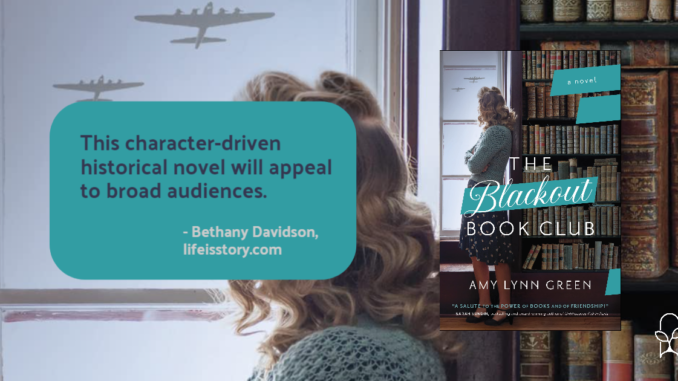
Also by this author: Things We Didn't Say
Published by Bethany House Publishers on November 15, 2022
Genres: Fiction, Christian, Historical
Buy on Amazon
Goodreads

An impulsive promise to her brother before he goes off to the European Front puts Avis Montgomery in the unlikely position of head librarian in small-town Maine. Though she has never been much of a reader, when wartime needs threaten to close the library, she invents a book club to keep its doors open. The women she convinces to attend the first meeting couldn't be more different--a wealthy spinster determined to aid the war effort, an exhausted mother looking for a fresh start, and a determined young war worker.
At first, the struggles of the home front are all the club members have in common, but over time, the books they choose become more than an escape from the hardships of life and the fear of the U-boat battles that rage just past their shores. As the women face personal challenges and band together in the face of danger, they find they share more in common with each other than they think. But when their growing friendships are tested by secrets of the past and present, they must decide whether depending on each other is worth the cost.
I have enjoyed Amy Lynn Green’s two previous novels, and this third one is excellent as well. Although each of her books so far focuses on World War II, they all cover unique and different elements of the home front experience, involving authentic period details and different little-known impacts of the war. The Blackout Book Club focuses on regional concerns in Maine, such as U-Boats off the coast, and explores different themes related to the main characters’ relationships and problems. The chapters rotate between different points of view, but each woman has such a distinct voice that I always knew whose perspective I was reading from, and I found each of the narratives fully engaging. I did predict one major plot twist, but I don’t think it needs to be a surprise. It’s enjoyable to see the details come together over time.
It’s a delightful twist on book-related stories that Avis is only in charge of the library because her librarian brother is deployed. Her initial disinterest in reading creates amusing conflicts throughout the story, and keeps this from becoming another novel that leans on stereotypes or panders to librarians. The book-related elements were a delight to me, because they all felt so realistic and genuine. This novel celebrates the power of books to bring people together in a way that feels real instead of sentimental. I love how Green wrote about each book club meeting through the characters’ irreverently written meeting minutes. I laughed so much at the humorous observations and clever takes on things that people said, and I appreciate how the characters reflect a variety of opinions, genre preferences, and reactions to books.
This story is very character-driven, and there isn’t a lot of action, so if someone is looking for something more suspenseful, they might want to try The Lines Between Us, Green’s previous novel. However, I really enjoyed the slow-paced, thoughtful story, since the characters and their relationships were all so convincing. Some readers will want to be aware that one of the subplots involves estrangement from an emotionally abusive spouse, if that is something that is sensitive for them, but the story handles this in a realistic, constructive way and doesn’t sensationalize the issue. Also, I appreciate how Green offset that subplot through another character’s marriage struggles, which reflect normal ups and downs without abuse. It’s helpful to compare the two, and to see the nuanced representation of marriage, since so many other books end with a proposal or a wedding and don’t engage with the challenges of building a life together afterwards.
I would recommend The Blackout Book Club to anyone who enjoys character-driven historical dramas. Although this book comes from a Christian publisher, there is nothing preachy about it, and there is no reason why secular readers wouldn’t enjoy this as well. There are occasional references to the characters’ faith and thoughts about God in a way that is authentic to their lives and the time period, but there is nothing preachy or message-driven about the book. I would recommend this to anyone who finds the premise appealing.



